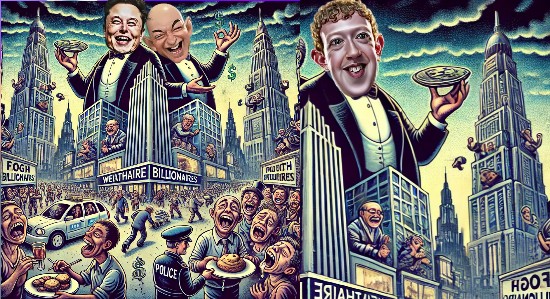Billionaires Tax Cuts | Senator Bernie Sanders has never been one to mince words when it comes to economic inequality. His latest criticism? The fact that Jeff Bezos, Elon Musk, and Mark Zuckerberg collectively increased their wealth by over $200 billion while the American middle class continues to shrink faster than an ice cube in the Sahara. To add fuel to the fire, former President Donald Trump assembled a cabinet featuring a record-breaking 13 billionaires. Some called it governance; others called it an exclusive yacht club meeting at taxpayer expense.
The irony, of course, is that these billionaires aren’t content with their already astronomical fortunes. Instead, they’re pushing for a Billionaires Tax Cuts so monumental that it would make even the most hardened Wall Street mogul blush. Sanders argues that the rich are effectively asking America to hand over its wallet, car keys, and maybe even the deed to the White House while they sip champagne on private jets.
Billionaires Tax Cuts: Trickle-Down or Drain-the-Public?
The Trump administration’s tax policies were championed as a way to stimulate economic growth, but critics argue they merely widened the gap between the ultra-rich and the rest of America. One of the most controversial moves? A massive Billionaires Tax Cuts that overwhelmingly benefited the wealthiest individuals and corporations, leaving middle and lower-income Americans with little more than a pat on the back and a “good luck” note.
Billionaires Tax Cuts | Elon Musk, who somehow ended up as the head of the Department of Government Efficiency (DOGE) (yes, you read that right), spearheaded federal spending cuts that resulted in over 10,000 government employees being let go. The justification? Efficiency. The result? A Reuters/Ipsos poll shows that 58% of Americans worry these cuts will weaken Social Security and student aid—services that, unlike Bezos’ space tourism adventures, are actually essential to everyday Americans.
Sanders’ Wealth Tax: A Billionaire’s Worst Nightmare?
Billionaires Tax Cuts | In response to this economic injustice, Bernie Sanders has rolled out his own proposal: a progressive wealth tax aimed at ensuring that billionaires contribute their fair share. His plan? Taxing net worths exceeding $50 million, with escalating rates for those sitting atop mountains of gold like modern-day Smaugs.
Supporters argue this would generate significant revenue for public services, including education and healthcare. Critics, primarily the billionaires in question, claim that such a tax would stifle innovation, conveniently forgetting that the rest of America is too busy choosing between rent and groceries to care about their next yacht upgrade.
Billionaires Tax Cuts | Is America’s Economic Model Unsustainable?
The combination of skyrocketing billionaire wealth, heavy representation in government, and policies that cater to the elite raises an important question: Is the U.S. economic model sustainable? Some economists warn that the growing wealth disparity could lead to political instability, social unrest, and, dare we say it, a good old-fashioned revolution.
While billionaires dream of Mars colonies and space tourism, millions of Americans dream of affordable housing and healthcare. The juxtaposition is striking, and Sanders isn’t the only one noticing. The wealth gap isn’t just growing—it’s becoming a chasm wide enough to fit Musk’s entire SpaceX fleet.
Billionaires Tax Cuts | When Greed Historically Goes Too Far!
Historically, unchecked greed has led the U.S. into economic disasters. Let’s take a quick (and painful) trip down memory lane:
The Great Depression (1929-1939)
- What Happened? Rampant stock market speculation, easy credit, and little regulation led to the 1929 crash.
- Greed’s Role: Overleveraged companies and reckless banks profited while everyday Americans suffered.
- Outcome: A decade of economic ruin, 25% unemployment, and widespread poverty.
The Savings and Loan Crisis (1980s-1990s)
- What Happened? Deregulation led to reckless lending and fraudulent real estate investments.
- Greed’s Role: Bank executives prioritized short-term gains over financial stability.
- Outcome: Over 1,000 S&Ls collapsed, costing taxpayers $132 billion.
The Dot-Com Bubble (1990s-2000s)
- What Happened? Overhyped tech startups raised millions with no real business model.
- Greed’s Role: Companies exaggerated their potential to lure investors.
- Outcome: The NASDAQ lost 80% of its value, and tech startups went bust.
The Great Recession (2007-2009)
- What Happened? Subprime mortgage lending and reckless financial practices caused the housing bubble to burst.
- Greed’s Role: Banks prioritized profit over stability, while rating agencies misled investors.
- Outcome: The worst economic downturn since the Great Depression, massive job losses, and a government bailout of banks.
The COVID-19 Corporate Cash Grab (2020-Present)
- What Happened? While millions lost jobs, corporations saw record profits.
- Greed’s Role: Price gouging in healthcare, housing, and energy exacerbated inflation.
- Outcome: Slower economic recovery and a higher cost of living for everyday Americans.
So, What’s Next? The Fork in America’s Road
Billionaires Tax Cuts | The big question remains: Will the U.S. continue down a path where billionaires control the government while the middle class erodes? Or will policies like Sanders’ wealth tax gain momentum, shifting the balance of economic power?
History shows that when wealth disparity becomes too extreme, change—whether through legislation or social unrest—is inevitable. America stands at a crossroads, and while billionaires may hope to escape to Mars, the rest of the country still has to live with the consequences of their policies.
So, is this how a revolution begins? If history has taught us anything, it’s that greed has a way of overplaying its hand. And when that happens, well, let’s just say, heads tend to roll—figuratively speaking, of course.














